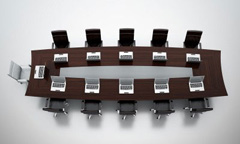Business Meeting Attendance
They speak different language. They have different business behaviors.
E.J.Spence will sit on your side of the boardroom table.
E.J.Spence will sit on your side of the boardroom table.
E.J.Spence attends the business meetings as the interpreter, and, upon your request, as the negotiator.
It should be very helpful to have someone on your side, advising you the Japanese business manners and culture, which quite often are totally different from the Western manners.
 Japanese may exchange business cards even before they shake hands or bow.
Japanese may exchange business cards even before they shake hands or bow. Debates are not appreciated unless very close relationship is established, they are considered rude. Initial negotiations begin with middle managers on the front, enabling issues to be brought back to senior management and examined.
Debates are not appreciated unless very close relationship is established, they are considered rude. Initial negotiations begin with middle managers on the front, enabling issues to be brought back to senior management and examined.  Punctuality is a must in all business and social meetings
Punctuality is a must in all business and social meetings Traditions are highly honored. Both business and personal relationships are hierarchical. Older people have higher status than younger, men higher than women and senior executives higher than junior executives.
Traditions are highly honored. Both business and personal relationships are hierarchical. Older people have higher status than younger, men higher than women and senior executives higher than junior executives. Sending a manager with equivalent rank/title is important when a meeting is held.
Sending a manager with equivalent rank/title is important when a meeting is held. Work is always undertaken as a group. The workgroup is strongly united with no competition; all succeed or all fail. Decision-making is by consensus. Everyone on the work team must be consulted before making decisions. This is a very slow process.
Work is always undertaken as a group. The workgroup is strongly united with no competition; all succeed or all fail. Decision-making is by consensus. Everyone on the work team must be consulted before making decisions. This is a very slow process. First meetings may be focused in establishing an atmosphere of friendliness, harmony and trust. Always allow ten minutes of polite conversation before beginning business meetings.
First meetings may be focused in establishing an atmosphere of friendliness, harmony and trust. Always allow ten minutes of polite conversation before beginning business meetings. It takes several meetings to develop a contract. When the time comes, be content to close the deal with a handshake. Leave the signing of the written contract to later meetings.
It takes several meetings to develop a contract. When the time comes, be content to close the deal with a handshake. Leave the signing of the written contract to later meetings. Etiquette and harmony are very important. "Saving face" is the key concept. Japanese are anxious to avoid unpleasantness and confrontation. Try to avoid saying "no." Instead, say, "This could be very difficult," allowing colleagues to save face.
Etiquette and harmony are very important. "Saving face" is the key concept. Japanese are anxious to avoid unpleasantness and confrontation. Try to avoid saying "no." Instead, say, "This could be very difficult," allowing colleagues to save face. When the prospect client may say "We would like to study your product", it can mean "No, we have no interest in your product".
When the prospect client may say "We would like to study your product", it can mean "No, we have no interest in your product". Do not bring a lawyer. It is important to show your business relationship is based on trust. The Japanese do not appreciate bulky legal documents with aggressive clauses. Japanese contracts cover only the essential points and unsaid conditions are to be comprehended gentlemanly, and settled amicably.
Do not bring a lawyer. It is important to show your business relationship is based on trust. The Japanese do not appreciate bulky legal documents with aggressive clauses. Japanese contracts cover only the essential points and unsaid conditions are to be comprehended gentlemanly, and settled amicably.
 Japanese may exchange business cards even before they shake hands or bow.
Japanese may exchange business cards even before they shake hands or bow. Debates are not appreciated unless very close relationship is established, they are considered rude. Initial negotiations begin with middle managers on the front, enabling issues to be brought back to senior management and examined.
Debates are not appreciated unless very close relationship is established, they are considered rude. Initial negotiations begin with middle managers on the front, enabling issues to be brought back to senior management and examined.  Punctuality is a must in all business and social meetings
Punctuality is a must in all business and social meetings Traditions are highly honored. Both business and personal relationships are hierarchical. Older people have higher status than younger, men higher than women and senior executives higher than junior executives.
Traditions are highly honored. Both business and personal relationships are hierarchical. Older people have higher status than younger, men higher than women and senior executives higher than junior executives. Sending a manager with equivalent rank/title is important when a meeting is held.
Sending a manager with equivalent rank/title is important when a meeting is held. Work is always undertaken as a group. The workgroup is strongly united with no competition; all succeed or all fail. Decision-making is by consensus. Everyone on the work team must be consulted before making decisions. This is a very slow process.
Work is always undertaken as a group. The workgroup is strongly united with no competition; all succeed or all fail. Decision-making is by consensus. Everyone on the work team must be consulted before making decisions. This is a very slow process. First meetings may be focused establishing an atmosphere of friendliness, harmony and trust. Always allow ten minutes of polite conversation before beginning business meetings.
First meetings may be focused establishing an atmosphere of friendliness, harmony and trust. Always allow ten minutes of polite conversation before beginning business meetings. It takes several meetings to develop a contract. When the time comes, be content to close deal with a handshake. Leave the signing of the written contract to later meetings.
It takes several meetings to develop a contract. When the time comes, be content to close deal with a handshake. Leave the signing of the written contract to later meetings. Etiquette and harmony are very important. "Saving face" is key concept. Japanese are anxious to avoid unpleasantness and confrontation. Try to avoid saying "no." Instead, say, "This could be very difficult," allowing colleagues to save face.
Etiquette and harmony are very important. "Saving face" is key concept. Japanese are anxious to avoid unpleasantness and confrontation. Try to avoid saying "no." Instead, say, "This could be very difficult," allowing colleagues to save face. When the prospect client may say "We would like to study your product", it can mean "No, we have no interest in your product".
When the prospect client may say "We would like to study your product", it can mean "No, we have no interest in your product". Do not bring a lawyer. It is important to show your business relationship is based on trust. The Japanese do not appreciate bulky legal documents with aggressive clauses. Japanese contracts cover only the essential points and unsaid conditions are to be comprehended gentlemanly, and settled amicably.
Do not bring a lawyer. It is important to show your business relationship is based on trust. The Japanese do not appreciate bulky legal documents with aggressive clauses. Japanese contracts cover only the essential points and unsaid conditions are to be comprehended gentlemanly, and settled amicably.
You may be making business trips to Japan to explore the advanced market and the technologies at various exhibitions held in Japan. Your business trip can be more fruitful and beneficial, when E.J.Spence accompanies you during your visit to Japan.
E.J.Spence will book your accommodations and travelling tickets in accordance with your itinerary.






